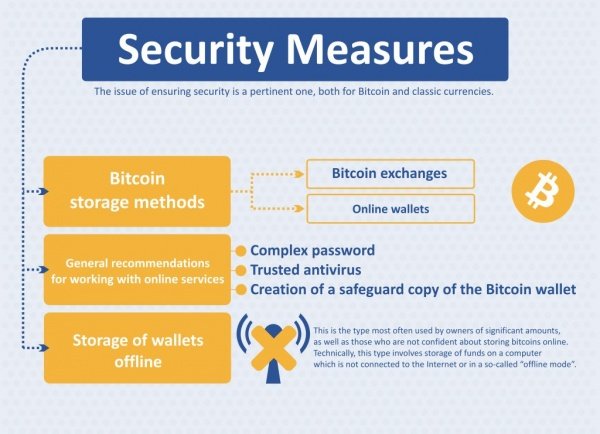Security Measures

The issue of ensuring security is a pertinent one, both for Bitcoin and classic currencies. In the comparatively short existence of Bitcoins, hackers have often made attempts to break into wallets online, of which many were successful.
The majority of break-ins took place due to insufficient security measures being in place for stored funds. In certain cases, a non-encrypted copy of a wallet has remained on the server, while in others theft has occurred from a profile containing elevated privileges. This signifies the need to pay attention when selecting cryptocurrency storage not just to security levels but also the ease of use of the chosen resource.
Contents
Bitcoin storage methods
Today there exist several ways of storing bitcoins. The simplest and therefore most generalized are online services which include Bitcoin exchanges and online wallets. Each of these has its advantages and disadvantages; so that users can choose an appropriate option, we will look more closely at each of these methods.
Bitcoin exchanges
Many users use Bitcoin exchange services to varying degrees as well as mining experts who perform the buying or selling of cryptocurrency. To avoid losses, it is necessary to withdraw any significant funds from exchanges and immediately after executing a transaction, place them back in an offline personal wallet.
Of course, the credibility of an exchange is hugely important, but in practice, Bitcoin theft occurs on even the largest of them. For example, in 2011 the Mt. Gox exchange suffered a hacking attack. The company was responsible for loss of funds. Clients of the Bitfloor exchange were less fortunate, however. In 2012 they lost all funds when the service was broken into.
Online wallets
Online wallets have several advantages which compensate for their main downside, i.e. elevated risk of being broken into. When working with them there is no need to worry about installing special software on your computer. Each device has access to the wallet. Moreover, certain online wallets allow the use of a number of additional services such as instant transfer of funds between users or Bitcoin mixers.
Online wallets come in the following forms: traditional and hybrid. In the former, the service itself provides checking of transactions and manages private keys, while the latter has no direct access to Bitcoin.
General recommendations for working with online services
- Coded phrases and passwords must be fairly complex. If users have problems choosing a password themselves, a password generator can be used. It must not be forgotten that in the event of a password being lost, it will be generally impossible to regain access to the wallet.
- Installation of trusted antivirus software. Each user has access to antivirus software. Some are more trusted than other, which is why the main thing in this case is not to forget to check for the most current version of the software.
- Creation of a safeguard copy of the Bitcoin wallet. This can be done by copying a file from the wallet onto another computer, USB stick or even a compact disk. This will help to reestablish access in situations such as hard disk failure or loss (theft) of the device.
Storage of wallets offline
This is the type most often used by owners of significant amounts, as well as those who are not confident about storing bitcoins online. Technically, this type involves storage of funds on a computer which is not connected to the Internet or in a so-called “offline mode”. There are also Bitcoin clients which are looking at creating of similar “cold” wallets.
Moreover, a paper Bitcoin wallet generator can be used. This tool is used to generate and print two types of keys onto paper: public and private. The first is used to obtain funds, the second to withdraw bitcoins.